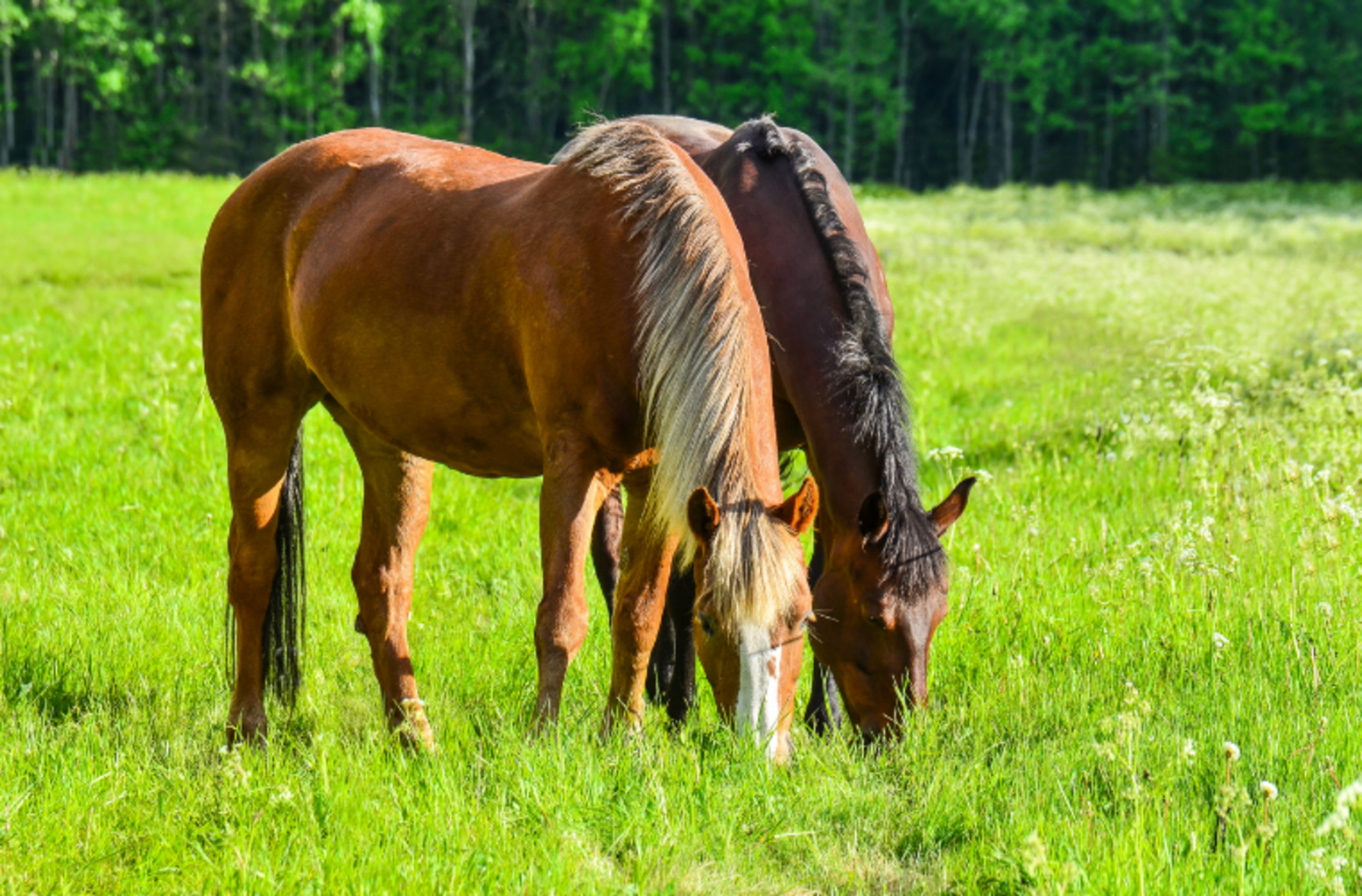Intestinal Rehabilitation in Horses
The Intestine is an Extremely Important Organ for the Horse.
It has a very complex structure and takes on many tasks in the horse's body. Its main task, however, is digestion. If the intestine can no longer work properly, this can lead to health problems such as colic, faecal water, immune deficiency, metabolic disorders or emaciation.
A healthy gut is therefore very important when it comes to the general health of our horses. We explained the anatomy and function of the intestine in detail in another post (The horse's digestive system). This report specifically addresses the need for intestinal rehabilitation and its correct implementation in order to optimise the function of the intestine.
Primarily, intestinal rehabilitation should rebuild or optimise the natural balance of the intestine. The focus is on the horse's large intestine, as this part of the intestine is the cause of most health problems.
Before an intestinal rehabilitation is carried out, it should be ensured that the horse is kept and fed correctly. This means that the horse should have enough exercise and exercise in the fresh air every day and be kept in an environment that is as stress-free as possible. The feeding should also be adapted to the nature of the horse: the horse has access to high-quality hay or grass at all times. Water should always be freely available. Supplementary feed, juice feed and treats should be supplemented or reduced according to the level of performance. Too much concentrate, (hay) silage and the excessive use of carrots and apples should be avoided.
Intestinal rehabilitation only makes sense with healthy and species-appropriate feeding. If the feeding is not correct, intestinal rehabilitation can also be carried out, but the success is very likely to be less.
In the following, some symptoms are listed by which one can recognize that the horse could have a problem in the digestive tract. It is sometimes difficult to distinguish exactly where the problem originates, as a symptom can affect several organs. That is why we advise you to always involve a veterinarian or veterinary practitioner as a consultant. If necessary, faecal samples or a blood sample can provide further information about the problem.
Possible symptoms of problems in the bowel:
- Changed or picky eating behaviour
- (Prolonged) Diarrhoea
- Faecal water
- Immune weakness, which usually manifests itself in the form of allergies, eczema, susceptibility to infection and/or poorly healing wounds
- Colic (of any severity)
- Thin horses do not gain weight despite the constant availability of hay
- Frequent yawning and/or wheezing
- Bloated stomach and gas (while moving)
- Kicking or biting under or towards the belly
- Faeces (from other horses), litter or sand are eaten
- Changes in behaviour such as a decline in performance, nervousness, aggression or nervousness
If one or more of the symptoms mentioned occur, a bowel rehabilitation can help to restore the balance of the bowel.
There is no ONE solution for intestinal rehabilitation!
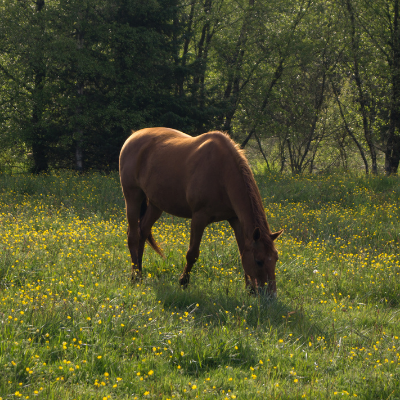
In the following, we will present products and herbs that can be fed to carry out an intestinal rehabilitation.
However, each horse must be viewed individually and other existing diseases, such as metabolic diseases such as Cushing, must be taken into account. A veterinarian or animal healer can advise you on the composition and cater to your horse individually.
Which products we recommend for intestinal rehabilitation can be found below:
Tannin herbs and bitter herbs
The bitter or tannins in the herbs can increase intestinal motor skills (peristalsis) and reduce possible putrefactive processes in the intestine. In addition, bitter substances can reduce the expansion of blood vessels. The tanning / bitter herbs include, for example:
- Yarrow
- Dandelion (root)
- Sage
You can feed these herbs individually or as a mixture of herbs. Yarrow and sage are, for example, contained in the Stiefel Intestinal Herbs or the Stiefel Intestinal Herb Juice. Both products can help regulate the horse's intestinal tract and relieve the symptoms mentioned above, such as faeces or diarrhoea.
Most horses are reluctant to eat bitter herbs. The horses are usually picky and then leave the feed in the trough. To avoid this problem, it is a good idea to cover the bitter taste of the herbs with milder herbs.
Mild Herbs
Mild herbs not only cover the bitter taste; they can also have a positive effect on the intestines. The herbs can have a calming effect and can reduce gas or bloating. The mild herbs include:
- Anise
- Fennel seeds
- (Black) Caraway seeds or black seed oil
- Thyme (can have a positive effect on putrefactive processes in the intestine)
- Oregano (can also have a positive effect on the intestines during putrefactive processes)
You can also feed the mild herbs individually or you can use a ready-made herb mixture. As a ready-made herbal mixture, the Stiefel Intestinal Herbs or the Stiefel Intestinal Herb Juice are also suitable for mild herbs.
Both products contain both the important bitter herbs and the mild herbs such as chamomile, anise and oregano. Buying a ready-made herbal mixture spares you a long search for the different herbs and the appropriate weighing of the different herbs, because the important herbs (components) are contained without any further additives.
Many of the above symptoms can be alleviated with regular use of the products.
Liquorice Root
ATTENTION with metabolic diseases like Cushing! It is not advisable to administer it!
The active ingredients in liquorice can help alleviate possible inflammatory processes in the intestine. Liquorice can also have a positive effect on incorrect fermentation. Since many of the above symptoms can be accompanied by inflammation or malfermentation, liquorice is a great support for the intestines.
Liquorice root should not be fed for longer than 3 weeks at a time, as the horse cannot digest liquorice optimally or only with difficulty. To achieve the greatest possible effect, you can simply brew the liquorice like a tea and let it steep in hot (not boiling!) Water for about 10 minutes. The finished tea and the root can then be tipped over the concentrate.
ATTENTION: Make sure that the tea is not too hot.
Omega 3 and 6 fatty acids
A good ratio of omega 3 and 6 fatty acids can help reduce possible inflammation in the intestinal tract.
Hemp seeds and hemp oil have a good Omega 3 and 6 fatty acid ratio and can therefore have a positive effect on inflammation. The same applies to linseed or linseed oil. Linseed oil is rich in omega 3 fatty acids and can therefore also help with the regeneration of inflammation in the intestine.
Implementation of Intestinal Rehabilitation
An intestinal rehabilitation can be carried out every 2 weeks. That means the following:
The cure is started by feeding liquorice for 2 weeks. After a two-week break, another two-week administration of liquorice takes place.
In parallel to the liquorice, you feed an individual mixture of tannic herbs / bitter herbs and the mild herbs for 6 weeks - or you can use ready-made juices and / or herbal mixtures, such as the Stiefel Intestinal herbs or the Stiefel Intestinal Herb Juice . Linseed oil can also be fed continuously for 6 weeks.
If the horse suffers from faecal water or diarrhea, flea seeds (husks) can be fed as a supplement to the intestinal cleansing. Psyllium husks act as a binding agent in the intestine and can thus alleviate faecal water and/or diarrhoea. The psyllium husks can also be fed for 6 weeks. If the symptoms improve, the amount fed should be reduced.
ATTENTION : When dosing, strictly follow the guidelines and always soak with enough water, otherwise blockages can occur!
Each horse should be dealt with individually during intestinal rehabilitation in order to be able to treat any other symptoms such as aggression, anxiety or nervousness and to optimise the general health of the animal. Therefore, as a final word, the request to fall back on the advice of a veterinarian or animal health practitioner for any form of therapy or feed change. Of course, keeping and feeding also have to be right, because intestinal rehabilitation is not a miracle cure. It is only a supplementary support for building and maintaining the natural balance in the intestines of our horses.
Latest reviews
-
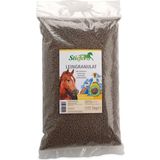 5.0 (7)
5.0 (7)Stiefel Linseed Granules, 5 kg
Bestseller- Ready-to-feed linseed cake
- High mucilage content
- Reduced fat content due to cold pressing
£17.80 (£3.56 / kg)Delivery by March 03
-
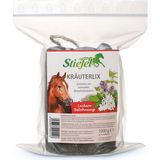 4.8 (10)
4.8 (10)Stiefel Kräuterlix Horse Lick, 1 kg
- Lick stone with bronchial herbs
- A tasty reward
- With attached cord to tie it up
£13.33 (£13.33 / kg)Delivery by March 03
-
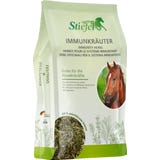 5.0 (8)
5.0 (8)Stiefel Immunity Herbs , 1 kg
Bestseller- 100% natural herbal mixture
- Immunity herbs
- Good for the body's defences
£22.27 (£22.27 / kg)Delivery by March 03
-
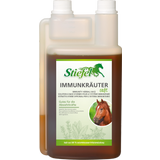 4.8 (6)
4.8 (6)Stiefel Immunity Herbal Liquid, 1 l
- To support the immune system
- Made of 100% natural herbs
- No added sugar
£15.12 (£15.12 / l)Delivery by March 03
-
Great Britain: Free standard delivery from £79.90
-
Free
returns Secure payments
with SSL encryption technology

